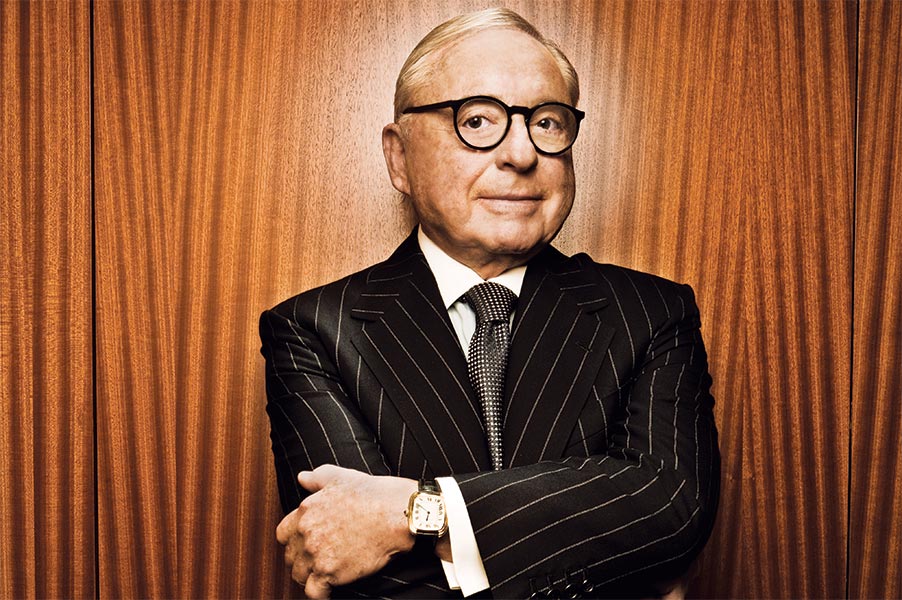My Philadelphia Story: D. Herbert Lipson
Chairman, "Philadelphia" magazine, and “Off the Cuff” columnist; Philadelphia; 79

D. Herbert Lipson, photographed in 2008 by Chris Crisman.
WHAT DOES ANYBODY do in City Hall? Will you tell me what anybody does over there?
I came here in June of ’52. I was a kid, just 23. I studied international affairs at Lafayette, and I was on my way to get an interview with the State Department for a job, because I didn’t want to work for my father.
But he asked me to help out selling ads — the magazine was the family business. I didn’t have a car. I took subways, buses, trolleys. I stuck my nose in other people’s business.
When I came to the city, it was fabulous, with great shopping — Gimbels, Strawbridge’s, Lit Brothers. People dressed.
But there weren’t restaurants — we had 10 restaurants or something. There were a lot of great oyster houses, on every corner. It was a Philly thing. I love oysters.
My father fired me every other week. We were opening mail by hand — I bought a mechanical letter-opener, probably under $100. “You always want to be fancy,” he said, and fired me. His partners would tell him to bring me back.
In the ’50s, there wasn’t a division between advertising and editorial in the magazine. But a clear separation between church and state is what gives Philadelphia magazine its credibility.
You always expect the politicians to steal a little bit, but most of them usually leave something for the people of the city. In Philadelphia, they don’t leave anything. They just take it all.
In the early ’70s, Frank Rizzo was upset when he heard that I had a motorcycle — he started out as a motorcycle cop. I had a 650 Triumph, a big bike, and I didn’t wear a helmet. “You’re gonna kill yourself,” he told me. Then he bent down behind his desk and pulled up a police helmet that the motorcycle cops wore, and threw it at me, almost like a football. He said, “Wear this.” And I did.
We wanted to be noticed. There was nothing worse than being ignored. We were referred to as the enfants terribles by the New York Times. We were driven, and kept asking, “What can we do to piss people off?”
With a piece we were doing in the ’60s about swingers on the Main Line — I thought the world was coming to an end, that we’d get killed for running it. I couldn’t sleep. I met [editor] Alan Halpern at two in the morning in the office. What would it cost to pull the story and re-print? The price was so exorbitant, we couldn’t. Then I’m at a party at Stockton Strawbridge’s, and his wife comes over to me: “I want you to know, your story was wonderful, and it really goes on. It really goes on on the Main Line.”
I’d get furious with Rizzo. Somebody would tip me off — it was always outrageous things. I heard he wanted to make Goldie Watson, a corrupt community organizer, a deputy mayor. So I went running over to City Hall, past the bodyguards. I asked him if it was true, that he was appointing Goldie Watson because he wanted to have a black deputy mayor. He said, “You don’t understand.” That was always his response: “You don’t understand.”
Philadelphians just kind of shrug and go on. They should be mad as hell.
I never thought about running for office. I’d rather be close to the king’s ear. Anyway, I couldn’t have been elected dogcatcher. I don’t think I’m electable — I have a sordid past.
People ask me if I watch Mad Men. Watch it? I lived it. I watch it and get red-faced. I’m embarrassed by what I did.
It’s comfortable in Philadelphia. There are a lot of good things. It’s a livable city. There are a lot of good people here. It could be beautiful — more beautiful.
I guess I really love it here. I’m a small-town guy, really.
Maybe I’m a masochist.
The vast underclass is the biggest problem in the city. You don’t see it in other cities like Boston, with half the city in poverty. I don’t think anybody knows what to do about it.
I lost a lot of friends over the years, because of things we wrote. That’s the turf. If you can’t take it, do something else.
Power fascinates me.
If you do a good job in New York, they say, “Boy, you did a great job.” Here, if you get too successful, they’re pissed off.
I’ve had a lot of offers to sell the company over the years. But what would I do with myself? I’d get crotchety — or more crotchety.
I never feel lonely. If I get lonely, my wife and I go sit at a bar.
I used to have a “Thank God It’s Monday Club” with a couple other guys. I couldn’t stand weekends. There’s no action.
Published in the December 2008 issue of Philadelphia magazine.


